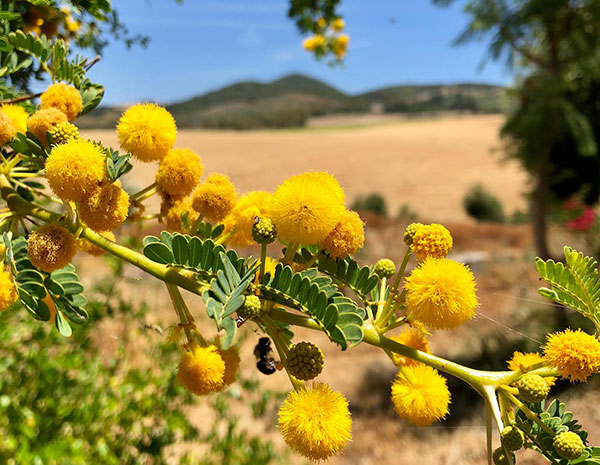From the 200-year-old olive grove to the forest of edible fruit trees, the 20 hectare-farm at Danyadara in southern Spain is now bursting with life. But four years ago, when farm manager Jacob Evans arrived at this yoga retreat centre on top of a hill in Andalusia, in southern Spain, the land was cracked and barren.
Wheat and sunflowers are farmed across vast areas of southern Spain – green for just a short while, with up to eight months of drought, land is ploughed and left bare for most of the year.
“If low rainfall continues, I’m scared for what this area might look like in 20 years,” says Evans, 29, who is determined to buck the trend of desertification by transforming Danyadara into an abundant organic farm and dense food forest by following the principles of permaculture.

“Conventionally, straw from the wheat is stripped off and sunflower stalks are burnt, so nothing decomposes on the ground and the nutrient cycle is broken, releasing carbon into the atmosphere and destroying soil microbial life,” he explains.
Desertification is an ‘acute’ threat, according to a report published by the European Court of Auditors in 2018, which states that 74 per cent of Spain is at risk of desertification, making it one of the most seriously affected regions alongside southern Portugal, southern Italy and Cyprus. Defined in the report as “land degradation in arid, semi-arid and dry sub-humid areas”, desertification is caused by various factors including climate change, poor farming methods and deforestation.
But Evans also refers to the UK’s farming landscape as a “green desert” and wants British farmers to take note. “There may not be a pronounced dry season [in the UK], but industrial agriculture is mining the earth and a severe lack of biodiversity makes this monoculture more susceptible to crop failure in extreme climate conditions. There’s no resilience.”

By growing a more diverse range of crops, including white aubergines, pomegranates, kale and coriander, Evans believes that permaculture can increase food security while replenishing nutrient-depleted soils.
“Permaculture farms are well-managed with trees, animals and crops to regenerate soil while growing better than organic food,” explains Evans, who first experienced regenerative agriculture while travelling in Brazil and Costa Rica.
Alongside 80 beehives, a few alpacas, sheep and donkeys graze among the seven-acre olive grove to “recycle nutrients and create fertility”. In another field, previously farmed for wheat and sunflowers, Evans has planted 5,000 carob, mulberry, almond, oak and fig saplings that follow the topography of the land in a ‘keyline’ pattern, a permaculture technique to maximise water use, with pasture in between to maximise biodiversity.
“Years of heavy ploughing exposed this soil to hot sun and heavy rains. Now, the laws of nature – growth, death and decay – are the only ones that matter,” he adds. Young trees are grown close together and pruned regularly, with leaf litter and offcuts left to create a humid, decomposing layer on the soil that absorbs water and provides nutrients for surrounding plants.
“The farm evolves over time with natural succession and for every one per cent increase of carbon content, the soil’s water holding capacity can be increased by 140,000 litres of water per hectare,” says Evans.
“We’re creating an edible landscape – in the future, we’ll produce fig jam, almond butter, carob chocolate, and more table olives and cold-pressed olive oil to sell direct to consumers.”

Some might argue that permaculture won’t produce the yields that conventional farming can, but he says the trick is diversity: “Add up the yields of every crop and it can be just as much,” says Evans, who sows seeds all year-round to grow enough to feed staff and the constant influx of yoga retreat guests.
But the value in crop diversity isn’t just the belief of a fringe farming system.
“Our food system is operating outside of its planetary boundaries – we don’t just need to fix it; we need a complete system change that goes beyond farming,” says James Lomax, food systems and agricultural advisor for the United Nations Environment Programme (UNEP). According to UNEP, the current food system is bad for our health and for the environment and while 75 per cent food comes from just 12 plants and five animal species, biodiversity is severely threatened and 33 per cent soils are degraded.

“Yes, sustainable agriculture is fantastic but the economic drivers that have pushed farming to more input-intensive methods still remain,” says Lomax, who wants governments to build integrated sustainable food programmes that combine health, livelihoods and environmental outcomes. “We have to look at agriculture, consumption, food waste, supply chains but also consider politics around the subsidies, policies and regimes that incentivise good practice such as greater rotation.”
Lomax hopes that the UN Food Systems Summit, due to take place in September 2021, will create a push for what he describes as “net positive agriculture”. “That not only includes permaculture but also organics, agroecology, zero budget natural farming which is being pioneered in India, for example – it’s farming that puts back more than it takes. Small, pioneering farms like Danydara really show what is possible.”
And as Evans adds, optimistically: “There are so many crops that can grow here if we care for the land. Southern Spain has been a bread basket in the past and it can be again.”









What a super article. It gives me hope to read of what this young man is achieving. It makes me want to get down to Spain and help!